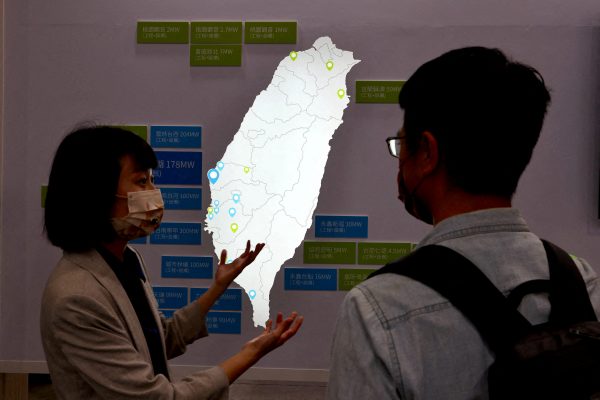These strategies encompass renewable sources (wind and solar, hydrogen, innovative energy), energy systems (storage, savings and efficiency), de-carbonisation (capture, sinks and carbon-free vehicles), zero waste, green lifestyle, green finance and just transition.
To achieve net-zero emissions by 2050, Taiwan aims to increase the share of renewables and natural gas in its energy mix to 20 per cent and 50 per cent respectively, while reducing the share of coal to 30 per cent by 2025.
Implementing this pathway can contribute to sustainable growth in several ways. First, it can serve as a model for other Asia-Pacific Economic Cooperation (APEC) member economies. Taiwan has long been an engaged member of APEC, recognising the value of APEC’s non-binding and voluntary framework as an ideal platform for facilitating knowledge exchange.
Most APEC economies have committed to achieving net-zero emissions by 2050. This collective commitment can foster the group’s leadership and cooperation to tackle climate change effectively. By leading efforts to reduce greenhouse gas emissions and promoting sustainable development, this grouping — led by Taiwan’s example — can inspire and motivate others to follow suit. Taiwan’s 12 key strategies cover a wider range of sustainability indicators compared to other economies, so they can be used as a reference for policy formulation.
The pathway’s emphasis on technology R&D will also drive innovation and the creation of new technologies. Taiwan can use these advancements as a bridge between developing and developed countries in APEC — supporting their transition towards low-carbon and sustainable economies. Taiwan’s impressive track record in innovation can also be leveraged to develop and deploy low-carbon technologies and solutions.
Taiwan can also collaborate with like-minded APEC economies through capacity building, information sharing and collaborative R&D. This can enhance the capabilities of interested economies within the region to jointly tackle climate change and advance sustainable development. Taking a proactive stance in this space can contribute to the construction of a more resilient and sustainable future for the entire region.
The United States is hosting the 2023 APEC meeting with the theme ‘Creating a Resilient and Sustainable Future for All’, which centres around three key priorities of interconnectedness, innovation and inclusiveness. These three priorities are essential for achieving sustainable growth, as is the active involvement of the United States.
Interconnectedness emphasises the importance of collaboration among APEC economies in tackling common challenges, including climate change. Innovation is critical for developing new technologies and solutions that can effectively reduce carbon emissions and promote sustainable growth. Inclusiveness ensures that the benefits of sustainable growth are shared by all, regardless of their social or economic status.
The United States has also committed to achieving net-zero emissions by 2050. President Joe Biden’s administration has proposed significant investments in infrastructure, clean energy and R&D, which can drive innovation and support the transition to a low-carbon economy.
Hosting the 2023 APEC meeting presents a unique opportunity for the United States to showcase its dedication to sustainable growth and to cultivate collaboration among APEC economies to address the challenge of climate change. Through initiatives and policies that prioritise environmental sustainability, innovation and inclusivity, the United States can harness its economic leadership to propel sustainable growth forward and construct a resilient and sustainable future that benefits all stakeholders involved in the APEC region.
Taiwan’s commitment to net-zero emissions makes it a key player in terms of realising the priorities of APEC 2023. By focussing on sustainable growth, de-carbonisation and global collaboration, Taiwan’s pathway aligns well with APEC’s objectives of promoting sustainable growth and reducing carbon emissions.
The pathway’s broad range of strategies, including energy transition, circular economy and disaster risk reduction, represents a crucial step towards sustainable growth. Adopting Taiwan’s strategy on a regional level can help APEC economies effectively collaborate to combat climate change, fostering an environment conducive to inclusive and innovative solutions.
Recognising that climate change is a global issue that necessitates collective action, the pathway urges APEC economies to collaborate in sharing knowledge, expertise and best practices. For example, Taiwan organised the ‘APEC Forum on Creating New Employment Opportunities in the Era of Net-Zero Economy’ in May 2023, with the aim of jointly exploring economic incentives for net-zero carbon emissions with like-minded APEC economies.
The pathway also aligns with APEC 2023’s inclusiveness priority by promoting sustainable development across various sectors of the economy and society. Taiwan’s pathway provides a reference point for APEC economies to tackle climate change and achieve sustainable growth in their own contexts.
The pathway’s emphasis on technology R&D can fuel innovation and create new low-carbon technologies and solutions, aligning it well with APEC 2023’s innovation priority. For example, smart grids are transforming the global energy market, and Taiwan has been adopting and working on improving this technology to enhance energy efficiency, decrease reliance on fossil fuels and promote renewable energy integration. Leveraging Taiwan’s technological expertise and capabilities, the pathway presents a valuable opportunity to advance low-carbon and sustainable economies.
Taiwan’s pathway encompasses a comprehensive strategy that aligns with the objectives of APEC 2023. By promoting collaboration, innovation, inclusiveness and sustainable development, Taiwan can assume a leading role in constructing a more resilient and sustainable future for all.
Darson Chiu is Research Fellow at the Taiwan Institute of Economic Research and APEC Study Center.

